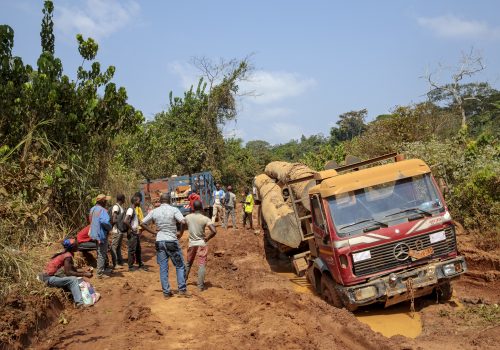April 20, 2020
African private sector mobilizes COVID-19 response
Governments around the world have shut borders, imposed lockdowns, and mobilized resources for the battle against COVID-19. “Flatten the curve” has become a mantra among policy makers and the effort to secure the necessary public health supplies for citizens has created competitors out of neighbors. The opposite is happening in the private sector as companies that are competitors are now collaborating in the name of public health.
The private sector response is even more important in resource-constrained African countries. The pan-African business organization, AfroChampions—which was created to help fight Ebola—has launched a COVID-19 response fund in partnership with the African Union and the Africa Centres for Disease Control and Prevention (Africa CDC), aiming to raise over $150 million to support the continental response and procure the necessary medical supplies. The funds are being contributed by a coalition of African banks, including Ecobank, Standard Bank, and Equity Bank; several private equity firms; and healthcare companies.
At a national level, there are emerging alliances among both the large blue chip companies and startups in Africa’s largest markets—Nigeria, Kenya, and South Africa—that are mobilizing finances, skills, and supplies to aid governments in the fight against the pandemic. In Nigeria, the Dangote Group, Access Bank, Zenith Bank, Guaranty Trust Bank, MTN, and KPMG have come together to form the Coalition Against COVID-19 (CACOVID) that is providing financing for immediate purchase of medical supplies and the creation of isolation centers. Guaranty Trust Bank worked quickly to transform a stadium into a 110-bed isolation center within five days in partnership with Lagos State.
One of the most wide-ranging, ambitious, and comprehensive interventions has been in Kenya. A team of startups in ecommerce, clean cooking stoves, and micro-distribution created a platform called Safe Hands Kenya to deploy free soap, hand sanitizer, cleaners and disinfectants, and masks to Kenyans through hundreds of thousands of distribution points. The coalition is unique in that it pairs startups with established manufacturers, has raised an operational budget, and has appointed a full-time project team. All parties have committed to a zero profit margin on Safe Hands’ activities and to delivering with speed even to the last mile.
Lockdowns are simply unsustainable as weeks pass because African economies are dependent on informal employment and daily earnings. Solutions such as Safe Hands Kenya will be increasingly necessary to achieve the ubiquitous wearing of masks and to entrench public health-oriented behavior change. The most successful private sector efforts will marshal a combination of low-tech and high-tech solutions to combat COVID-19. Soap and masks are the most basic of interventions, but combined with geospatial mapping of supply and demand trends, efforts like Safe Hands Kenya can make progress against what is proving to be a globally daunting challenge.
Aubrey Hruby is a senior fellow with the Atlantic Council’s Africa Center. She is also Co-Founder of Insider and the Africa Expert Network. Follow her on Twitter @AubreyHruby.
Questions? Tweet them to our experts @ACAfricaCenter.
For more content, go to our Coronavirus: Africa page.
Image: Community leaders in Bria, Central African Republic are sensitized on preventative measures against COVID-19 and a local response plan. (Flickr/UN Mission in the Central African Republic)


